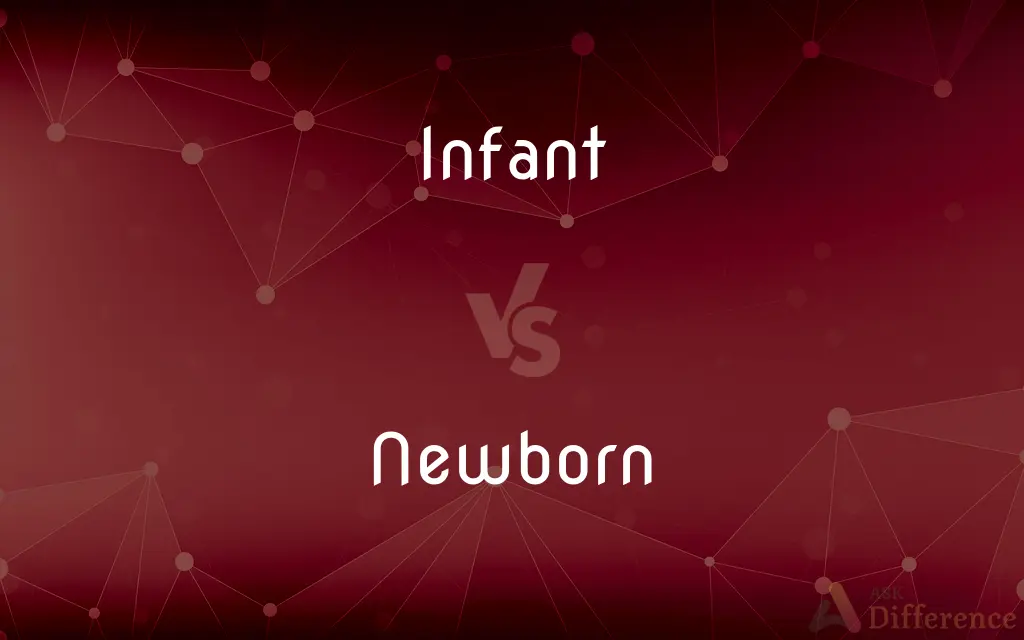Infant vs. Newborn — What's the Difference?
By Tayyaba Rehman & Maham Liaqat — Updated on May 13, 2024
An infant is a child in the early stages of life, up to 12 months old, while a newborn refers to a baby from birth to about 2 months old.

Difference Between Infant and Newborn
Table of Contents
ADVERTISEMENT
Key Differences
An infant encompasses a broader age range, including all developmental stages from birth up to one year. Newborns, on the other hand, specifically refer to the very first stage of life, from birth until approximately two months.
While infants gradually develop skills like smiling, sitting, and starting to babble over months, newborns are primarily focused on basic functions such as sleeping, feeding, and slowly adjusting to the sensory stimuli of the outside world.
Infants are involved in rapid physical growth and motor development, reaching milestones like crawling and standing with support. On the other hand, newborns are in the initial phase of gaining control over simple movements and often spend most of their time sleeping.
In terms of healthcare, infants receive a series of vaccinations and regular check-ups to monitor growth and development through varied stages. Whereas newborns undergo initial health screenings, such as hearing tests and the checking of reflexes, which are crucial in the first few days and weeks of life.
Infants often start to interact more with people and their environment, showing early signs of personality and preferences. Newborns, however, are mainly reactive, responding primarily to comfort, feeding, and sleeping needs.
ADVERTISEMENT
Comparison Chart
Age Range
Birth to 12 months
Birth to about 2 months
Development
Milestones in motor skills, social interaction
Initial adjustments to sensory inputs, basic reflexes
Sleep Pattern
Begins to regulate sleep cycle
Predominantly sleeping, up to 17 hours a day
Health Care
Regular vaccinations, developmental screenings
Immediate postnatal screenings, first vaccinations
Interaction
Increased interaction with environment, shows preferences
Limited interaction, mainly responses to basic needs
Compare with Definitions
Infant
Receives multiple rounds of vaccinations.
The infant was scheduled for regular vaccinations to prevent common illnesses.
Newborn
Has very basic reflexes and responses.
The newborn's grip reflex was strong when the doctor examined him.
Infant
Shows early social behaviors.
The infant smiled in response to his mother's voice.
Newborn
Undergoes initial health and development checks.
The newborn passed all his hearing and sight tests.
Infant
A child in the early stages of life, specifically from birth to one year old.
The infant started walking at 10 months.
Newborn
A very young baby, especially from birth to around two months old.
The newborn slept peacefully in her mother's arms.
Infant
Undergoes significant growth and developmental changes.
Her infant quickly outgrew his clothes within the first year.
Newborn
Very recently born
A newborn baby.
Infant
Begins to explore their environment.
The infant showed curiosity about the toys around him.
Newborn
Born anew
Newborn courage.
Infant
An infant (from the Latin word infans, meaning 'unable to speak' or 'speechless') is the more formal or specialised synonym for the common term baby, meaning the very young offspring of human beings. The term may also be used to refer to juveniles of other organisms.
Newborn
A neonate.
Infant
A child in the earliest period of life, especially before being able to walk.
Newborn
Born.
Infant
(Law) A person under the legal age of majority; a minor.
Newborn
Born anew, reborn.
Infant
A very young nonhuman mammal, especially a primate.
Newborn
A recently born baby.
Infant
Of or being in infancy.
Newborn
Recently born.
Infant
Intended for infants or young children.
Newborn
A baby recently born, usually less than one month old; a neonate.
Infant
Newly begun or formed
An infant enterprise.
Newborn
A baby from birth to four weeks
Infant
A very young human being, from conception to somewhere between six months and two years of age after birth, needing almost constant care and attention.
Newborn
Recently borne;
A newborn infant
Infant
(legal) A minor.
Newborn
Having just or recently arisen or come into existence;
New nations
With newborn fears
Infant
(obsolete) A noble or aristocratic youth.
Newborn
Requires frequent feeding every few hours.
The newborn needed to be fed eight times a day.
Infant
(obsolete) To bear or bring forth (a child); to produce, in general.
Newborn
Highly dependent on caregivers for comfort and needs.
The newborn cried to be held and comforted frequently.
Infant
A child in the first period of life, beginning at his birth; a young babe; sometimes, a child several years of age.
And tender cries of infants pierce the ear.
Infant
A person who is not of full age, or who has not attained the age of legal capacity; a person under the age of twenty-one years; a minor.
Infant
Same as Infante.
Infant
Of or pertaining to infancy, or the first period of life; tender; not mature; as, infant strength.
Infant
Intended for young children; as, an infant school.
Infant
To bear or bring forth, as a child; hence, to produce, in general.
This worthy motto, "No bishop, no king," is . . . infanted out of the same fears.
Infant
A very young child (birth to 1 year) who has not yet begun to walk or talk;
Isn't she too young to have a baby?
Common Curiosities
What are common health checks for newborns?
Common health checks include screenings for hearing, sight, heart issues, and other immediate health concerns.
What defines an infant?
An infant is defined as a child from birth up to one year of age.
At what age do infants usually start to crawl?
Infants typically begin to crawl between 6 to 10 months old.
What defines a newborn?
A newborn refers to an infant from birth to approximately two months old.
How do the developmental stages of infants and newborns differ?
Newborns focus on basic sensory adjustments and survival reflexes, while infants develop more complex motor skills and social interactions.
Why do newborns sleep so much?
Newborns sleep up to 17 hours a day to support rapid physical and neurological development.
How often should newborns be fed?
Newborns need to be fed about every 2 to 3 hours.
Why is the newborn stage considered critical?
The newborn stage is critical for establishing feeding, bonding, and initial health status checks.
Can infants recognize their mother's voice?
Yes, infants can recognize their mother's voice, often starting to show recognition within the first few months.
What vaccines are given to infants in their first year?
Vaccines given in the first year often include those for hepatitis B, rotavirus, DTaP, Hib, pneumococcal, and polio.
How can parents support their infant’s development?
Parents can support development through engaging play, responsive communication, and providing a stimulating environment.
How do caregivers interact differently with infants compared to newborns?
Caregivers may begin more interactive play and communication as infants grow, while interaction with newborns focuses on comforting and meeting basic needs.
What are some signs of developmental delays in infants?
Delays in reaching movement milestones like rolling over, sitting, or babbling can be signs of developmental delays.
When do infants start to recognize familiar people?
Infants can start to recognize familiar faces and voices around 3 to 4 months old.
What typical behaviors do newborns display?
Typical newborn behaviors include sucking, grasping, startle reflexes, and frequent sleeping.
Share Your Discovery

Previous Comparison
Mage vs. Sage
Next Comparison
Seminoma vs. NonseminomaAuthor Spotlight
Written by
Tayyaba RehmanTayyaba Rehman is a distinguished writer, currently serving as a primary contributor to askdifference.com. As a researcher in semantics and etymology, Tayyaba's passion for the complexity of languages and their distinctions has found a perfect home on the platform. Tayyaba delves into the intricacies of language, distinguishing between commonly confused words and phrases, thereby providing clarity for readers worldwide.
Co-written by
Maham Liaqat















































